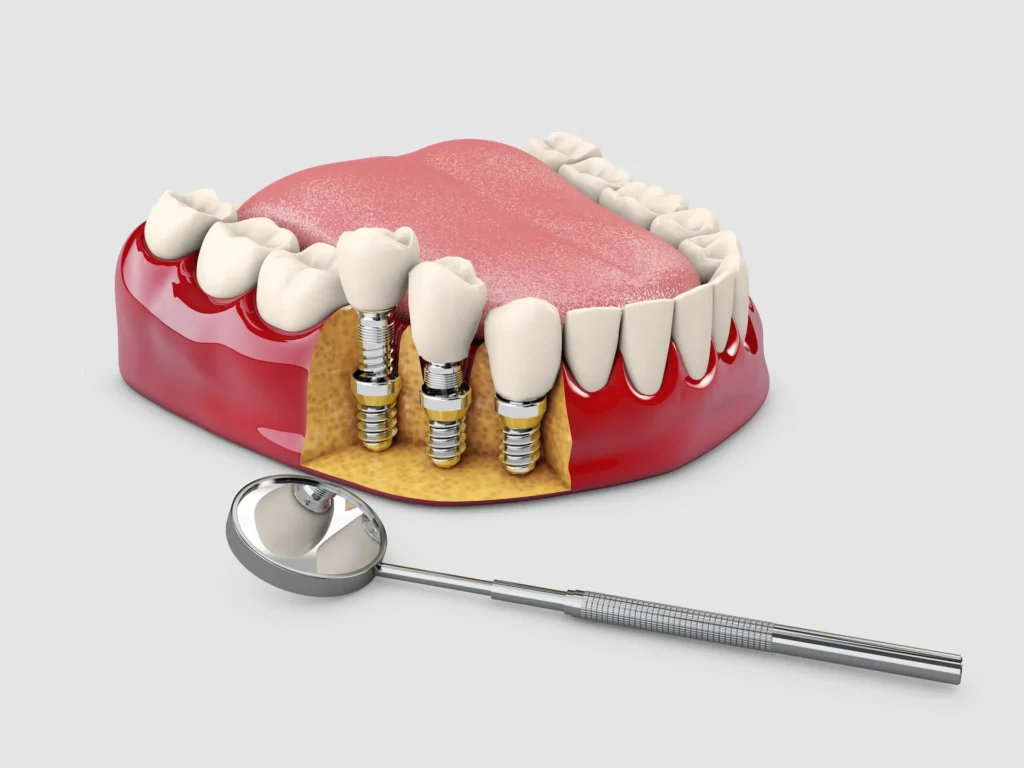People often confuse permanent dentures and implants, but the two have a few distinct differences.
In this article, we’ll try to clarify the differences between permanent dentures and implants. However, it’s important to note that consulting with a dental implant specialist can give you a more comprehensive understanding of these contrasts. We are here to provide some insight, but expert advice is always recommended.
Key Takeaways
- Permanent dentures and dental implants both replace missing teeth, but differ in design, stability, and longevity.
- Permanent dentures are removable prosthetics often supported by implants or adhesives.
- The term “dental implants” refer to the implant posts surgically placed into the jawbone for a secure, long-lasting solution.
Quick Look: Permanent Dentures vs. Dental Implants
Permanent dentures are dentures that are designed to remain in the mouth for the long term. They are usually made of acrylic resin and metal and are held in place with dental implants.
The dental implants are titanium posts surgically placed into the jawbone and used to support dental prostheses like dentures or bridges.
Understanding Permanent Dentures
Permanent dentures, also known as full dentures, are dental prosthetic devices used to replace all natural teeth in the upper or lower arch.
Permanent dentures consist of an acrylic base designed to fit the mouth’s contours, artificial teeth to replace missing natural teeth, and other types of permanent dentures such as metal clasps or precision attachments. The acrylic base can also be designed to be matched to the color of the patient’s gums.
Artificial teeth are types of permanent dentures made from porcelain, plastic, or a combination of both materials. They are custom-made to match the patient’s natural teeth in size, shape, and color. They are also designed to look and function just like natural teeth.
Other types of permanent dentures include metal clasps or precision attachments. Metal clasps anchor dentures in place, while precision attachments are more comfortable and provide a more secure fit.
Exploring Dental Implants

How do dental implants work, and how are they placed into the jaw?
Dental implants are a form of prosthetic replacement for missing or decayed teeth. A titanium post is surgically inserted into the jawbone, and a replacement tooth is attached to the post. The process of implantation is designed to mimic the natural process of tooth root formation, allowing the implant to blend in seamlessly with the patient’s existing teeth.
Besides mimicking a natural tooth, what other advantages do dental implants allow?
Factors to Consider Before Getting Dental Implants
When considering permanent dentures vs. dental implants, you will need to consider the cost of the treatment, the time required, and the healing period. Your dentist will conduct a thorough evaluation of your oral health and bone density to determine if dental implants are viable for the patient.
Cost
The cost of dental implants can vary depending on the type of implant, the number of implants being placed, and whether you’ll need additional crowns. Fortunately, many financing options are available to help make dental implants more affordable.
Suitability
Your dentist will only be able to tell you if dental implants are suitable through a thorough evaluation of a patient’s oral health and bone density.
Time commitment
Besides the cost of the procedure, you should weigh the time that both the procedure and healing will take. Dental implants require multiple appointments as well as a healing period before the implants are fully integrated with the jawbone, so being aware of the time commitment associated with the treatment will help you make a decision.
Comparing Permanent Dentures and Dental Implants
Both permanent dentures and dental implants have pros and cons; weighing them side by side may be the best way to determine which is right for you.
| Permanent Dentures | Dental Implants |
| Removable prosthetic appliances | Custom-made and fit securely in the mouth |
| Made of acrylic or metal | Titanium screw topped with a replacement tooth |
| Can last up to five years | Can last a lifetime |
| $1,000 to $3,000 | $1,500 to $6,000 |
| Require ongoing maintenance costs | Requires minimal maintenance |
| Speech & chewing could be impaired | Natural chewing experience and improved speech |
| Could shift in the mouth | Provides stability for dentures or bridges |
The above table is a simplified comparison that gives you all the information you need at a glance. But keep reading if you want more details before you make your decision.

Permanent dentures are custom-made, removable prosthetic appliances that are used to replace missing teeth. They are traditionally made of acrylic or metal and can last up to five years. Dental implants, on the other hand, are titanium screws that are inserted into the jawbone and topped with a replacement tooth. They are a permanent solution and can last a lifetime with proper maintenance.
The cost of permanent dentures varies depending on the complexity of the treatment and the materials used. Generally, the cost of an upper or lower denture can range from $1,000 to $3,000. Dental implants are typically more expensive than dentures, costing anywhere from $1,500 to $6,000 per implant. However, the long-term investment of dental implants is much greater since they can last a lifetime with proper care, while dentures must be replaced every few years.
Permanent dentures typically cost less to get started than dental implants but require more ongoing maintenance costs due to the need to reline and rebase the dentures periodically. Dental implants require a greater initial investment but usually require less maintenance over time and therefore work out to be less expensive in the long run.
The availability of insurance coverage for permanent dentures or dental implants varies according to the individual plan. It is important to speak with your insurance provider or dental specialist to learn what is covered and what is not. Depending on the plan, some or all of the costs associated with either treatment option may be covered.
When comparing the functional aspects of permanent dentures vs. dental implants, it is important to consider how they affect eating, speaking, and overall comfort. Dental implants provide a more natural chewing experience and improved speech compared to permanent dentures.
Dental Implants blend seamlessly with the surrounding teeth to create a more realistic appearance. They are designed to blend with the existing teeth, providing a natural-looking smile.
The implants are custom-made to perfectly match your existing teeth’ size, shape, and color, creating a seamless integration with your natural teeth. This means dental implants look good or better than permanent dentures or even your natural teeth. You can smile, laugh, and talk without worrying about your dentures slipping or falling out. This can lead to improved self-confidence and a better overall quality of life.
When considering permanent dentures and dental implants, there are a few long-term considerations that you should take into account. For starters, dental implants require surgery and a lengthy recovery period. Some people may not be good candidates for dental implants if they suffer from certain medical issues or have a weakened immune system.
Permanent dentures, on the other hand, can be more affordable and require less recovery time. However, they are not as durable as dental implants and must be replaced every few years.
In order to ensure the longevity of permanent dentures and dental implants, it is important to follow a strict cleaning and maintenance routine. For dentures, it is important to brush and floss daily, along with cleaning them with a special cleaning solution. It is important to visit your dentist for periodic check-ups to ensure that they fit properly.
As for dental implants, it is important to brush, floss, and rinse with an antibacterial mouthwash daily. You should prioritize visiting your dentist for periodic check-ups to ensure that they are functioning properly.
The use of permanent dentures or dental implants can present some potential complications or risks. For dentures, the most common risks are gum inflammation and mouth sores. There is also a risk of the dentures slipping or falling out.
As for dental implants, the most common risks are infection and implant failure. You should discuss any potential risks and complications with your dentist before proceeding with either of these treatments.
Permanent Dentures or Dental Implants: Making an Informed Decision
When it comes to your oral health, it is important to consult with a dental professional to discuss your individual needs and concerns. Everyone’s oral health and medical history are different, so a consultation with a dental specialist in Houston is the best way to determine which dental procedure is right for you.
Remember to consider your personal preferences and lifestyle when choosing between permanent dentures and dental implants. Permanent dentures may be more cost-effective in the short term, while dental implants offer a more natural-looking smile.
Ultimately, weighing these factors and discussing them with your dentist is important to make the best decision for you.
FAQs
Are implants better than permanent dentures?
Implants are a more permanent and secure solution than dentures, offering a more natural-looking and functioning tooth replacement. On the other hand, permanent dentures rest on the gums and are held in place with a dental adhesive. They are not as secure or as stable as implants and do not provide the same level of functionality.
What is the downside to permanent dentures?
The major downside to permanent dentures is that they are not as secure or stable as implants.
Do permanent dentures feel like real teeth?
Unfortunately, no. Permanent dentures are made of acrylic and may feel bulky and uncomfortable. They are not as secure or as stable as implants and may be more difficult to use when eating and speaking.
Dental Implants or Permanent Dentures – Which is Right for You?
When it comes to replacing missing teeth, dental implants and permanent dentures are two options for restoring your smile. Implants are surgically inserted into the jawbone and provide a permanent solution to missing teeth, while dentures are removable and can often be more affordable.
Utilizing the latest in cutting-edge aesthetic and dental implant services in Houston, Hanna Dental is here to help you decide which option is best for you.
Contact us today to set up a consultation and learn more about your options!


